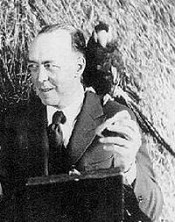Edgar Rice Burroughs (September 1, 1875 – March 19, 1950) was an American author, best known for his creation of the jungle hero Tarzan and the heroic Mars adventurer John Carter, although he produced works in many genres. Burroughs was born on September 1, 1875, in Chicago, Illinois, (although he later lived for many years in the neighboring suburb of Oak Park, Ill.), the son of a businessman. He was educated at a number of local schools, and during the Chicago influenza epidemic in 1891, he spent a half year at his brother's ranch on the Raft River in Idaho. He then attended the Phillips Academy in Andover, Massachusetts, and then the Michigan Military Academy. Graduating in 1895, and failing the entrance exam for the United States Military Academy (West Point), he ended up as an enlisted soldier with the 7th U.S. Cavalry in Fort Grant, Arizona Territory. After being diagnosed with a heart problem and thus found ineligible for a commission, he was discharged in 1897.[1] What followed was a string of seemingly unrelated and short stint jobs. Following a period of drifting and ranch work in Idaho, Burroughs found work at his father's firm in 1899. He married Emma Centennia Hulbert in 1900. In 1904 he left his job and found less regular work, initially in Idaho but soon back in Chicago.[2] By 1911, after seven years of low wages, he was working as a pencil sharpener wholesaler and began to write fiction. By this time Burroughs and Emma had two children, Joan and Hulbert.[3] During this period, he had copious spare time and he began reading many pulp fiction magazines and has since claimed: "...if people were paid for writing rot such as I read in some of those magazines, that I could write stories just as rotten. As a matter of fact, although I had never written a story, I knew absolutely that I could write stories just as entertaining and probably a whole lot more so than any I chanced to read in those magazines." Aiming his work at these pulp fiction magazines, his first story "Under the Moons of Mars" was serialized in All-Story Magazine in 1912[4][5] and earned Burroughs US$400 (roughly the equivalent of US$7600 in 2004). Burroughs soon took up writing full-time and by the time the run of Under the Moons of Mars had finished he had completed two novels, including Tarzan of the Apes, which was published from October 1912 and went on to begin his most successful series. In 1913, Burroughs and Emma had their third and last child, John Coleman. Burroughs also wrote popular science fiction and fantasy stories involving Earthly adventurers transported to various planets (notably Barsoom, Burroughs' fictional name for Mars, and Amtor, his fictional name for Venus), lost islands, and into the interior of the hollow earth in his Pellucidar stories, as well as westerns and historical romances. Along with All-Story, many of his stories were published in the Argosy Magazine. Tarzan was a cultural sensation when introduced. Burroughs was determined to capitalize on Tarzan's popularity in every way possible. He planned to exploit Tarzan through several different media including a syndicated Tarzan comic strip, movies and merchandise. Experts in the field advised against this course of action, stating that the different media would just end up competing against each other. Burroughs went ahead, however, and proved the experts wrong—the public wanted Tarzan in whatever fashion he was offered. Tarzan remains one of the most successful fictional characters to this day and is a cultural icon. In either 1915 or 1919, Burroughs purchased a large ranch north of Los Angeles, California, which he named "Tarzana." The citizens of the community that sprang up around the ranch voted to adopt that name when their town, Tarzana, Calif. was formed in either 1927 or 1928. Also the unincorporated community of Tarzan, Texas, was formally named in 1927 when the postal service accepted the name[6], reputedly coming from the popularity of the first (silent) "Tarzan of the Apes" film, starring Elmo Lincoln, and an early "Tarzan" comic strip. In 1923 Burroughs set up his own company, Edgar Rice Burroughs, Inc., and began printing his own books through the 1930s. Burroughs divorced Emma in 1934 and married the former actress Florence Gilbert Dearholt in 1935, the former wife of his friend, Ashton Dearholt, and Burroughs adopted the Dearholts' two children. This couple divorced in 1942.[7] At the time of the attack on Pearl Harbor, Burroughs was a resident of Hawaii and, despite being in his late sixties, he applied for permission to become a war correspondent. This permission was granted, and so he became one of the oldest war correspondents for the U.S. during World War II. After the war ended, Burroughs moved back to Encino, California, where, after many health problems, he died of a heart attack on March 19, 1950, having written almost seventy novels.[8] The Burroughs crater on Mars is named in Burroughs's honor. Edgar Rice Burroughs was a descendant of Edmund Rice, an English immigrant to Massachusetts Bay Colony, as follows:[9] [10] These three texts have been published by various houses in one or two volumes. Adding to the confusion, some editions have the original (significantly longer) introduction to Part I from the first publication as a magazine serial, and others have the shorter version from the first book publication, which included all three parts under the title The Moon Maid.[11]

























